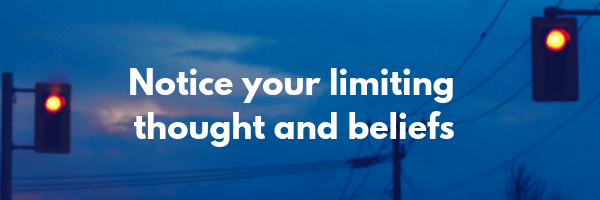
Notice Your Limiting Thoughts & Beliefs
Have you noticed how often we stop ourselves from trying something new, something outside what is comfortable, outside of what is expected of us (and who is it ‘expecting’ anyway? Is it others or our perception of what others think about us?).
Sometimes this flinch, this pulling back from the unknown or uncomfortable is obvious. We assess the situation and hear the inner monologue that talks us out of trying something new. At other times, the resistance is subtle. We may not even notice that out limiting thoughts have had their way, that our reticence and fear has decided for us before we were even conscious that there was a choice to be made.
There are myriad reasons why our limiting thoughts can be so prominent. Perhaps we’re worried we’ll feel silly, we will mess up or let ourselves down. Maybe that voice says, ‘this isn’t really me’ and we just accept it, consciously or subconsciously, leaving behind a trail of choices not taken, experiences abandoned and ingrained habitual patterns of thought and judgement.

Our inner critic, the author of these limiting thoughts, can be very persuasive. After all, it is the wise assessor, working hard to make sure we are kept safe, free from embarrassment and failure. However, how do we know that these judgements of our potential and of possible outcomes are accurate? How often do we stop and assess our mood and behaviour, being mindful of what is shaping our choices? Are we being overly cautious and if so, what is that costing us in terms of experience, growth, learning and even moments of true engagement and joy?
Research has shown that people who practice mindfulness regularly are more aware of the content of their thoughts and able to see them as passing phenomena rather than truths. Regular meditators are more likely to approach new situations as challenges rather than something to fear. They are more likely to utilise new ideas and methodologies and are more able to see their ‘mistakes’ as points of learning rather than something to hide in shame from. It is mindfulness that helps build such courage and resilience.
Don’t let our own judgements, those limiting thoughts about ourselves be the sole arbiter in our choices. Acknowledge the thoughts, let them be and see what happens when we try something we feel we cannot do. There is a world of experience, potential and learning out there if we just allow ourselves to welcome that uncertainty that is the natural precursor to life. Be courageous.
